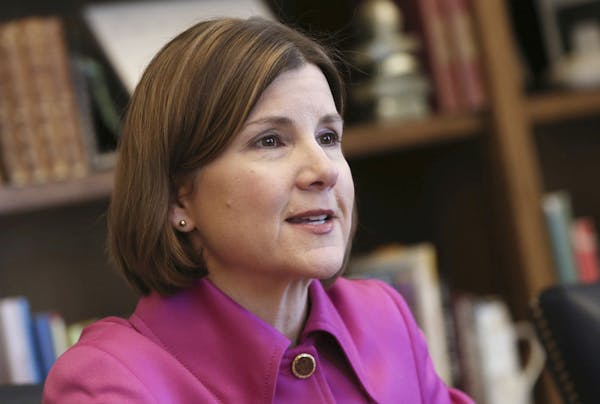A group of state legislators said Tuesday that it is considering regulations — even price controls — to rein in the soaring cost of insulin, which has crimped the budgets of thousands of Minnesota families and caused some diabetics to ration the medication.
With more than 460,000 diabetics in Minnesota, legislators say they are hearing many complaints from frustrated and worried constituents. Rationing insulin can lead to illness, even death.
Sen. Matt Little, DFL-Lakeville, convened a roundtable discussion at the State Capitol, which included several senators, two incoming House members and several patients and parents of children with diabetes.
"Something needs to change," said Alexis Stanley, a college student who was diagnosed with diabetes this year, just two months after her 19th birthday.
Stanley said her mother recently turned down a job because its health insurance wasn't as good as in her current job. That has Stanley concerned about how she'll pay for insulin in the future. "I'm scared to turn 26 and get off my parents' insurance," she said.
The price of insulin has more than tripled since 2002. Last October, Minnesota Attorney General Lori Swanson filed a lawsuit against the three big insulin manufacturers, alleging that they committed deceptive trade practices and consumer fraud to inflate prices. The drugmakers denied the allegations.
A vial of insulin can cost between $300 and $400, and the more convenient insulin pens can cost nearly $700 for a box of five, with some patients using one box every week. But many diabetics pay different prices based on their insurance coverage, as well as co-payments and deductibles.
"We spend more time struggling with insurance companies and struggling with pharmacies," said Lija Greenseid of St. Paul, whose 12-year-old daughter is diabetic.
Two years ago Greenseid learned just how much cheaper insulin is in other countries when her family traveled internationally. A box of insulin pens, for example, cost just $40 in Taiwan, $65 in Canada, $50 in Greece and $61 in Italy, she said. They saved so much money on insulin that it helped finance the trip.
"The cost of insulin is immorally high," Little said. "There appears to be no rational reason why the costs increased so much."
Several states have considered bills that would require pharmaceutical companies to be more transparent about prices, including requiring them to justify higher prices.
Little said he would push for that but that the situation requires a more "aggressive" approach.
"You'd have to work through the constitutional concerns, but Minnesota could set the price for what it could be sold for here in Minnesota," he said.
A spokesman for PhRMA, the industry trade group, said Tuesday that consumers are paying higher prices because insurers and pharmacy benefit managers aren't passing along discounts and rebates.
"We believe tasking the government with setting prices isn't the right solution and would be harmful to innovation and patients' access," said Nick McGee, PhRMA director of public affairs. "Instead, insurers should share more of the discounts they receive directly with patients."
Controlling drug prices is not a new topic in the Legislature. Last session, Sen. Scott Jensen, R-Chaska, introduced a bill that would have created a drug cost review commission with the power to review drug price increases and set lower prices. However, the bill did not get a committee hearing.
Another bill being considered would provide free or low cost insulin to diabetics who can't afford the drug. Incoming House member Mike Howard, DFL-Richfield, said he would introduce legislation to make insulin available at neighborhood pharmacies to those who can't afford the drug. Howard said details are still being worked out, but he hopes to have pharmaceutical companies pay for part of the program costs.
His bill echoes one introduced but not passed last session. Bill sponsor Rep. Erin Murphy, DFL-St. Paul, named the legislation in honor of Alec Smith, who died in 2017 at the age of 26 after rationing his insulin.
Both of Smith's parents addressed the roundtable Tuesday morning.
"Health care in America is in the middle of a crisis. We have to make some major changes to protect the lives of our loved ones," said Smith's father, James Holt Jr.

Marijuana's path to legality in Minnesota: A timeline

Minnesota to close state park on Iron Range, turn it back into a mine
U.S. Steel won't get exception to pollution rules that protect wild rice, MPCA says

Taste of Minnesota to be enjoyed on the ground and in the air this year

